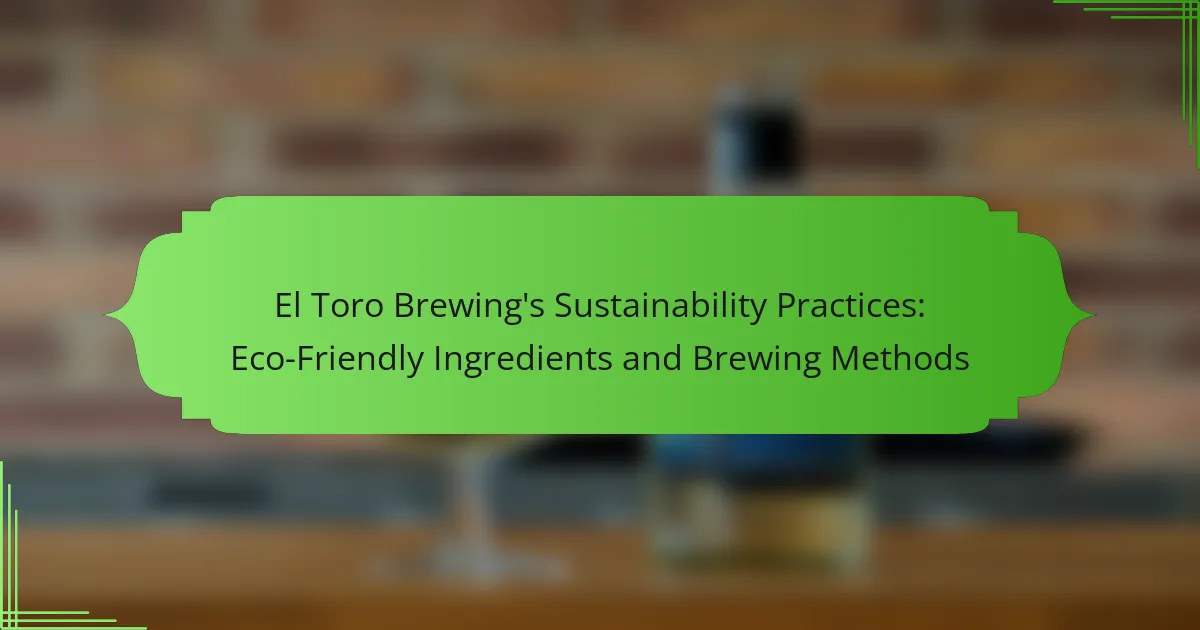El Toro Brewing is a brewery that integrates multiple sustainability practices into its operations. The brewery sources eco-friendly ingredients, such as organic hops and malts, from local suppliers to minimize transportation emissions and support regional agriculture. El Toro Brewing employs energy-efficient brewing equipment and implements water conservation techniques, including a closed-loop water system, to reduce energy and water usage. Their commitment to recycling waste materials and utilizing renewable energy sources further contributes to a lower carbon footprint, showcasing their dedication to environmentally friendly practices in the brewing industry.

What are El Toro Brewing’s sustainability practices?
El Toro Brewing employs several sustainability practices. They utilize eco-friendly ingredients sourced from local suppliers. This reduces transportation emissions and supports the local economy. The brewery also implements water conservation techniques in its brewing process. They recycle and repurpose waste materials whenever possible. Additionally, El Toro Brewing uses renewable energy sources to power its operations. These practices contribute to a lower carbon footprint. The brewery’s commitment to sustainability is evident in its overall operational strategies.
How does El Toro Brewing incorporate eco-friendly ingredients?
El Toro Brewing incorporates eco-friendly ingredients by sourcing organic grains and hops. They prioritize local suppliers to reduce transportation emissions. The brewery uses sustainable farming practices for their ingredients. This includes avoiding synthetic pesticides and fertilizers. El Toro Brewing also emphasizes the use of renewable resources in their production process. Their commitment to eco-friendly practices is evident in their ingredient selection. They aim to minimize their environmental impact while producing high-quality beer.
What types of eco-friendly ingredients does El Toro Brewing use?
El Toro Brewing uses organic grains, locally sourced hops, and sustainable yeast. Organic grains are grown without synthetic pesticides or fertilizers. This practice reduces environmental impact and promotes biodiversity. Locally sourced hops minimize transportation emissions and support local agriculture. Sustainable yeast strains are cultivated to enhance fermentation efficiency. These ingredients align with El Toro Brewing’s commitment to eco-friendly brewing practices.
How do these ingredients impact the brewing process?
Ingredients significantly influence the brewing process by affecting flavor, aroma, and fermentation. Hops contribute bitterness and aroma, balancing the sweetness of malt. Malt provides sugars necessary for fermentation, impacting the beer’s body and color. Yeast is crucial for fermentation, converting sugars into alcohol and carbon dioxide. Water quality and mineral content can alter the beer’s taste and mouthfeel. Each ingredient’s specific characteristics determine the final product’s profile. For instance, the use of organic ingredients can enhance sustainability while maintaining quality. This relationship between ingredients and brewing outcomes is essential for producing distinctive beers.
Why are sustainable brewing methods important for El Toro Brewing?
Sustainable brewing methods are important for El Toro Brewing because they minimize environmental impact. These methods reduce water usage, which is critical in brewing. For instance, El Toro Brewing implements water recycling systems. This helps conserve resources and lowers operational costs. Additionally, sustainable methods often involve local sourcing of ingredients. This supports local farmers and reduces carbon footprints. Adopting eco-friendly practices enhances brand reputation among environmentally conscious consumers. It also aligns with industry trends towards sustainability, attracting a broader customer base. Overall, these methods contribute to long-term viability and community support for El Toro Brewing.
What environmental benefits do these methods provide?
The environmental benefits of El Toro Brewing’s sustainability practices include reduced carbon footprint and conservation of natural resources. These methods utilize eco-friendly ingredients that minimize harmful emissions during production. For example, sourcing local ingredients decreases transportation emissions significantly. Additionally, energy-efficient brewing processes lower overall energy consumption. Water conservation practices are also implemented, reducing waste and preserving this vital resource. According to the Brewers Association, sustainable brewing can cut water usage by up to 50%. These practices contribute to a healthier ecosystem and promote biodiversity. Overall, El Toro Brewing’s methods support environmental sustainability and responsible resource management.
How does El Toro Brewing measure the effectiveness of its sustainability practices?
El Toro Brewing measures the effectiveness of its sustainability practices through specific metrics and assessments. They track energy consumption and waste production regularly. Water usage is monitored to identify areas for improvement. The brewery conducts lifecycle assessments of its products. These assessments help evaluate environmental impacts from production to disposal. Feedback from customers regarding sustainability is also collected and analyzed. This data informs future sustainability initiatives. Additionally, El Toro Brewing compares its practices against industry standards. This benchmarking helps ensure they meet or exceed sustainability goals.

What specific eco-friendly ingredients does El Toro Brewing utilize?
El Toro Brewing utilizes organic hops, organic malts, and locally sourced ingredients. Organic hops are grown without synthetic pesticides or fertilizers. Organic malts are produced from grains that meet organic farming standards. Locally sourced ingredients reduce transportation emissions and support regional agriculture. These choices align with El Toro Brewing’s commitment to sustainability. Their practices contribute to lower environmental impact in the brewing process.
How does El Toro Brewing source its ingredients sustainably?
El Toro Brewing sources its ingredients sustainably by prioritizing local suppliers. They partner with regional farmers to reduce transportation emissions. This practice supports the local economy and ensures fresher ingredients. Additionally, El Toro Brewing uses organic grains and hops when possible. This choice minimizes chemical use and promotes biodiversity. They also emphasize seasonal ingredients, which align with sustainable agricultural practices. By implementing these strategies, El Toro Brewing demonstrates a commitment to environmental responsibility.
What certifications do the ingredients hold?
The ingredients used by El Toro Brewing hold several certifications. These include USDA Organic certification, which ensures that the ingredients are grown without synthetic fertilizers and pesticides. Additionally, some ingredients may carry Non-GMO Project Verified status, confirming they are free from genetically modified organisms. Fair Trade certification may also apply, indicating that the ingredients are sourced under fair labor practices. Each certification is backed by specific standards and audits to maintain integrity and transparency in sourcing practices.
How does sourcing affect the quality of the final product?
Sourcing directly influences the quality of the final product. High-quality ingredients lead to superior taste and consistency. For example, locally sourced hops can enhance flavor profiles. Sustainable practices in sourcing ensure freshness and reduce environmental impact. Research shows that organic ingredients can improve overall product quality. A study from the Journal of Cleaner Production indicates that sustainable sourcing methods yield better sensory attributes. Thus, the sourcing process is critical for producing a high-quality final product.
What are the unique attributes of El Toro Brewing’s ingredients?
El Toro Brewing’s ingredients are characterized by their organic sourcing and local procurement. The brewery prioritizes using ingredients that are certified organic, ensuring no synthetic pesticides or fertilizers are used. Additionally, they source grains and hops from nearby farms, minimizing transportation emissions. Their unique approach includes using seasonal ingredients, which enhances freshness and flavor. El Toro Brewing also incorporates unique local fruits and spices in select brews, creating distinctive flavor profiles. This commitment to sustainability is evident in their ingredient selection process, which emphasizes ecological balance and community support.
How do these unique ingredients differentiate El Toro Brewing from competitors?
El Toro Brewing’s unique ingredients set it apart from competitors by emphasizing sustainability and local sourcing. These ingredients include organic grains and locally sourced hops. The use of organic grains reduces chemical exposure in agriculture. Sourcing hops from local farms supports regional economies and reduces transportation emissions. Additionally, El Toro Brewing incorporates rare herbs and spices that enhance flavor profiles. This commitment to unique ingredients creates distinct beer varieties not found in mainstream offerings. The brewery’s focus on eco-friendly ingredients aligns with growing consumer preferences for sustainable products. This differentiation attracts environmentally conscious consumers seeking unique, high-quality brews.
What rare ingredients does El Toro Brewing use, and why?
El Toro Brewing uses rare ingredients such as Himalayan pink salt and organic cacao nibs. Himalayan pink salt enhances the flavor profile of their brews. Organic cacao nibs add a unique chocolate essence, enriching the taste experience. These ingredients are selected to create distinctive flavors that stand out in the craft beer market. Using rare ingredients aligns with their commitment to quality and sustainability. El Toro Brewing aims to provide a unique drinking experience while supporting eco-friendly practices.

What brewing methods does El Toro Brewing employ to enhance sustainability?
El Toro Brewing employs several brewing methods to enhance sustainability. They utilize energy-efficient brewing equipment that reduces energy consumption. This equipment minimizes water usage during the brewing process. El Toro Brewing also implements a closed-loop water system to recycle water. They source local ingredients to reduce transportation emissions. Additionally, they prioritize organic and sustainable ingredients. This commitment supports environmentally friendly farming practices. El Toro Brewing’s methods contribute to a lower carbon footprint in their operations.
How does El Toro Brewing minimize waste during the brewing process?
El Toro Brewing minimizes waste during the brewing process by implementing a range of sustainable practices. They utilize spent grains as animal feed, which reduces landfill contributions. The brewery also recycles water used in the brewing process, decreasing overall water waste. Additionally, El Toro Brewing employs energy-efficient equipment, lowering energy consumption and associated waste. They engage in composting to manage organic waste effectively. These practices collectively demonstrate El Toro Brewing’s commitment to sustainability and waste reduction in their brewing operations.
What technologies are used to reduce water and energy consumption?
Technologies used to reduce water and energy consumption include water-efficient fixtures and energy-efficient appliances. Water-efficient fixtures, such as low-flow faucets and showerheads, significantly decrease water usage. Energy-efficient appliances, like Energy Star-rated refrigerators and dishwashers, lower energy consumption. Smart irrigation systems optimize water use in landscaping by adjusting based on weather conditions. Additionally, heat recovery systems capture waste heat from brewing processes, reducing energy needs. These technologies collectively contribute to sustainability in brewing practices.
How does the brewing method affect the flavor profile of the beer?
The brewing method significantly influences the flavor profile of beer. Different techniques such as boiling, fermentation, and aging contribute unique characteristics. For instance, the temperature during fermentation can enhance fruity or estery notes. The choice of hops and their timing in the brewing process alters bitterness and aroma. Additionally, methods like barrel aging introduce complex flavors from the wood. Studies have shown that variations in mash temperature can affect the sweetness and body of the beer. These factors combined create a diverse range of flavors, making each brewing method distinct.
What role does community engagement play in El Toro Brewing’s sustainability efforts?
Community engagement is crucial to El Toro Brewing’s sustainability efforts. It fosters collaboration between the brewery and local stakeholders. This collaboration enhances awareness of sustainable practices. El Toro Brewing participates in community events focused on environmental stewardship. They host workshops that educate the public on recycling and conservation. Additionally, they source ingredients from local farms, reducing transportation emissions. This practice supports local agriculture and strengthens community ties. Through these initiatives, El Toro Brewing actively promotes a culture of sustainability within the community.
How does El Toro Brewing collaborate with local suppliers and organizations?
El Toro Brewing collaborates with local suppliers and organizations by sourcing ingredients from nearby farms. This practice supports local agriculture and reduces transportation emissions. They partner with local grain suppliers to ensure fresh and sustainable raw materials. Additionally, El Toro Brewing engages with local businesses for co-promotions and events. This fosters community relationships and boosts local economies. Their collaboration extends to environmental organizations for sustainability initiatives. These partnerships enhance their commitment to eco-friendly brewing practices.
What initiatives does El Toro Brewing support to promote sustainability?
El Toro Brewing supports several initiatives to promote sustainability. They prioritize using eco-friendly ingredients in their brewing process. The brewery sources local and organic grains whenever possible. This reduces transportation emissions and supports local farmers. El Toro Brewing also implements water conservation techniques in their operations. They recycle and repurpose waste materials to minimize landfill contributions. Additionally, they use energy-efficient equipment to lower their carbon footprint. These practices align with their commitment to environmental stewardship.
What practical tips can consumers follow to support sustainable brewing practices?
Consumers can support sustainable brewing practices by choosing locally sourced ingredients. This reduces transportation emissions and supports local economies. They should also opt for breweries that prioritize organic and sustainable farming methods. Organic ingredients often use fewer chemicals and promote biodiversity.
Additionally, consumers can select beers packaged in eco-friendly materials. Cans and bottles that are recyclable or made from recycled materials have a lower environmental impact. Supporting breweries that implement water conservation techniques is also beneficial. Efficient water use in brewing processes helps preserve this vital resource.
Lastly, consumers can engage with breweries that practice waste reduction. Breweries that recycle spent grains or repurpose by-products contribute to a circular economy. By making informed choices, consumers can significantly impact the sustainability of brewing practices.
El Toro Brewing is a brewery that emphasizes sustainability through eco-friendly ingredients and brewing methods. The article details how El Toro Brewing sources organic grains and locally sourced hops to minimize environmental impact and support local economies. It also discusses the brewery’s water conservation techniques, waste reduction practices, and the use of renewable energy sources, all contributing to a lower carbon footprint. Additionally, the article highlights the importance of community engagement and collaboration with local suppliers in promoting sustainability initiatives.


